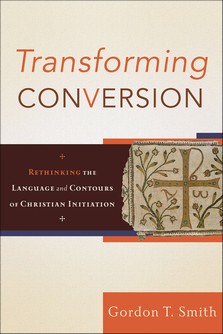 Over the past few years of leading a missional church in a resistant, urban context I’ve re-examined my inherited theology of conversion. Conversion to Christ in a post-Christendom era is more complex than it was 50 years ago. In trying to sort this out, I wrote this article was one foray into a more critical examination of “punctiliar” or point-in-time conversion. In 2009, I unpacked some of my concerns and conclusions at the LEAD ’09 Conference (session 3). Although helpful, these studies have felt very incomplete, which is why I seized upon the opportunity to review Transforming Conversion: rethinking the language and contours of Christian initiation.
Over the past few years of leading a missional church in a resistant, urban context I’ve re-examined my inherited theology of conversion. Conversion to Christ in a post-Christendom era is more complex than it was 50 years ago. In trying to sort this out, I wrote this article was one foray into a more critical examination of “punctiliar” or point-in-time conversion. In 2009, I unpacked some of my concerns and conclusions at the LEAD ’09 Conference (session 3). Although helpful, these studies have felt very incomplete, which is why I seized upon the opportunity to review Transforming Conversion: rethinking the language and contours of Christian initiation.
Book Overview
Transforming Conversion attempts to clarify the nature of Christian conversion by integrating biblical exegesis, historical and systematic theology, and experiential reflection. After introducing some salutary concerns, Smith moves into a exegesis of conversion in Ephesians and Acts. Building on his conclusions, he moves to insights gleaned from various theological streams throughout church history (Augustine/Early Church to Islam/Global Church). A final chapter on practical implications concludes the book.
Helpful Insights
Distinguishing Between “Conversion” and “Salvation”
Gordon Smith opens his book by stating the urgent need to theologically clarify the nature of conversion. Pointing to theological confusion created by our “revivalist past” and our missional present, his opening chapter offers several clarifying insights. First, he clarifies the difference between salvation and conversion, which were conflated with the language of the American revivalism. He suggests the reason for this conflation was to give the individual confidence in their self-selected conversion, regardless of its narrowing affect upon the cosmic doctrine of salvation. He writes: “The words salvation and conversion are not synonymous…salvation is the work of God; conversion is a human response to divine initiative.”
Conversion isn’t Punctiliar or Individualistic
A second helpful insight is that most conversions are not what our parents experienced–punctiliar, a point-in-time, sinners prayer that resulted in a profoundly pious and unmistakable point of entry into the kingdom of God. Gordon points out that most conversions are a process that take place over years.
The revivalist emphasis was upon individual conversion at the expense of conversion into a community. The overemphasis on human will failed to see that conversion is something that happens in community, that “the church mediates the experience of a conversion”, acting like a womb for new creation (188). He notes: “We must recover a deep appreciation of the communal character of all religious experience, beginning with conversion.” (10) I was particularly appreciative of his talk two conversions, though he falls short of mentioning the third conversion: “…conversion will be a conversion both to the church and to Christ, and the conversion to Christ will be cultivated and nurtured within a church community.” (183)
Conversion is Cosmically Situated
Through his study of Ephesians, Smith points out that the Bible often begins with a cosmic view of salvation and then narrows to God’s purposes for humanity. We typically begin with the individual, and only sometimes, make it out to the cosmic breadth of God’s saving work in Christ. We have it backwards. When we see the ascended Christ as a reigning Lord over all the earth, including those whom he graciously converts to his program of new creation, then we begin at the right place, the right hand of the Father. Bottomline—conversion is not about “asking Jesus into your heart”; it is about acknowledging Jesus Christ as Lord.
Hallmarks of Conversion
Here are the biblical hallmarks of Christian conversion according to Smith’s reflection on the New Testament:
- A result of Divine Initiative
- Requires Human Inquiry
- Gospel must be Preached
- Joy is Present
- Conversion is clarified by Baptism
Concluding Thoughts
Smith offers some very helpful and clarifying insights based on biblical reflection on conversion. The book interweaves historical and theological insights throughout these hallmarks of conversion mined from the New Testament. We would do well to consider these five factors in our gospel ministry, to guide others with biblical wisdom and pastoral care. Moreover, the emphasis on conversion to the church is something that will have to be rescued from the lion’s mouth of “organized religion” and placed back into the capable hands of the ascended Christ, who converts us, not to religion or to individualism but to his very own Body, his people, his bride. This requires patience, clear teaching, exemplary community living that gathers the saints, not around personalities or preaching, but around Jesus.
Although his final chapter makes a pass at the practical, Smith inadequately addresses the practical implications of his theological study, leaving us to do the hard work of bridging the biblical world to the contemporary world. What should we expect from those who experience process not punctiliar conversion? How do we guide them? What role does the community play? Who should baptize? We could have used another 100 pages on the outworking of this fine study! That said, this book is well-written, clear, insightful, and timely. Read a free excerpt here.
 This series is taken from my personal diary during the first couple of years of church planting. The entries range from painfully raw to joyfully visionary. I hope they bring encouragement to anyone who reads them, especially church planters.
This series is taken from my personal diary during the first couple of years of church planting. The entries range from painfully raw to joyfully visionary. I hope they bring encouragement to anyone who reads them, especially church planters.


